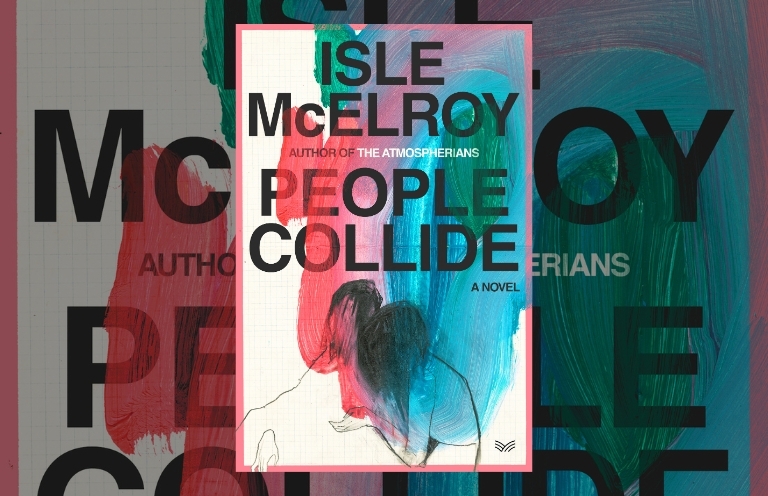 Why does anyone get married? Love and commitment probably come to mind for most but for Eli and Elizabeth Harding, two Americans living in Bulgaria, the answer is harder to decipher. People Collide, Isle McElroy’s follow-up to The Atmospherians, is a richly layered inquiry into intimacy and alienation that, as literature should, offers more questions than answers, and crafts a surprising and resonant narrative.
Why does anyone get married? Love and commitment probably come to mind for most but for Eli and Elizabeth Harding, two Americans living in Bulgaria, the answer is harder to decipher. People Collide, Isle McElroy’s follow-up to The Atmospherians, is a richly layered inquiry into intimacy and alienation that, as literature should, offers more questions than answers, and crafts a surprising and resonant narrative.
Elizabeth, the recipient of a literary fellowship and international praise, is farther along than Eli in her writing career. Eli is depressed and worn down by his self-proclaimed lack of talent and ambition. One day they switch bodies, though we only get inside the perspective of Eli as Elizabeth because Elizabeth (in Eli’s body) has left without a trace. And there are no answers about the how or the why of the switch, but this didn’t feel like a dodge. McElroy has more complex territory to explore. The novel also gives us three other marriages: Johanna and Henry who are Elizabeth’s parents, Desi and Kiril who own a café nearby, and Lauren and Eli’s father who abandoned them when Eli was young, whose marriage is more of a cautionary tale.
Eli spends four days alone grappling with being in his wife’s body, reflecting on his reasons for marrying Elizabeth,
“This isn’t to say we didn’t love each other; we had been dating for three years. However, in our marriage, love came secondary to the bureaucratic convenience that marriage provided. Though no one ever marries for love. They marry for weddings. They marry for money. They marry for clout. They marry to make children of married parents.”
Bodies shift in People Collide, and so does perspective. Johanna tries to comfort Eli (as Elizabeth), “‘Stories are always changing—you understand this better than anyone—or what I mean is we’re changing, even when the story remains the same. We change and thus we change the story, to better fit the person we are. I bet you could finish it for me, in your own way, of course. You know what happens next.’” In addition to her point that stories are bound to those who tell them and hear them, she presents the idea that telling stories is intimacy itself. How else do we get to know each other?
Kiril and Desi also seem to have a marriage built on a shaky foundation. Kiril at some point said he wanted a family but after years of trying and saying they can’t afford it he spends all their savings on a pizza oven when every restaurant around has one. Desi, who is older than Kiril, can’t hide her sadness and disappointment but doesn’t have options left to have the life she wants. Married life can sometimes amount to shared projects like running a pizza joint.
Johanna and Henry are convinced Eli has run off just like his father did, not realizing it is their daughter who has left them behind. The couple has had decades together, but not without strife. When Elizabeth was four years old Johanna had her second child and started seeing a visiting sculptor, Casey, at Landing, the artist retreat where she and Henry work. Attributing their sudden rehashing of the past to their grief at their daughter’s tragedy (they think Eli is gone forever), Henry tells the story of Casey and Johanna, who insists it was not an affair. He tells of Johanna’s loneliness and how she felt undesirable after the boy’s birth. Johanna defends Henry, telling Eli (as Elizabeth) that he was busy and he didn’t mean to neglect her when she needed emotional support. She describes her attraction; she wanted to be an artist before becoming a therapist: “It’s easy to confuse wanting to be someone with wanting to be with them.” That’s something pointed at Eli being a failed writer, though she thinks she is making that point to Elizabeth about Eli. Johanna wanted to be Casey, not be with him. What is revealed in the back and forth of this retelling is a shared history, a deep understanding between Henry and Johanna. We don’t get to, and we don’t need to, know what happened after Casey let Johanna inside his cabin decades ago. A car crashes outside the café and everyone rushes to look. Johanna and Henry reach for the others’ hand. Theirs is the story that lasts.
Art, like marriage, is an invitation to intimacy, to enter someone else’s perspective. Eli and Elizabeth are writers, Henry was a photographer before working as a chef at the artist retreat, and Johanna’s attraction to Henry and later Casey make clear her desire to create. Henry and Johanna were intentional in raising their children at Landing where they, “wished to raise their daughter inside the blast radius of creation…She would become someone important.” They have created a family with the same focused attention an artist would make a painting. What is love if not devoted focused attention?
The novel closes with Eli (as Elizabeth) holding Johanna’s hand in a way that only Elizabeth had held it as a child, “sliding her pinky and ring finger into the space between my ring and middle finger, as if her whole hand was an entire finger smaller than mine. She was the only person who’d ever held my hand in this way. There was nobody else.” In a world in which one’s own histories and achievements can slip away without cause or warning only moments of intimacy are truly ours to hold.
Publisher: HarperVia
Publication date: September 26, 2023
Reviewed by Jeannine Burgdorf
